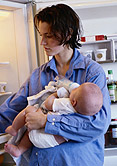
TUESDAY, April 21, 2015 (HealthDay News) — Babies feel pain in much the same way as adults, says a new study that challenges some experts’ beliefs that babies don’t feel pain.
Some people have argued that babies’ brains aren’t developed enough for them to really “feel” pain, said study lead author Dr. Rebeccah Slater, of the department of pediatrics at Oxford University in England. “Our study provides the first really strong evidence that this is not the case,” Slater said.
“Our study suggests that not only do babies experience pain, but they may be more sensitive to it than adults,” she said in a university news release.
The study included 10 healthy infants, ages 1 to 6 days, and 10 healthy adults, ages 23 to 36. All underwent MRI scans of their brains while they were poked on the bottom of their feet.
The results showed that 18 of the 20 brain regions that were active in adults in response to pain were also active in babies.
The scans also showed that babies had the same response to a weak poke as adults did to a poke that was four times stronger, which suggests that babies have a much lower pain threshold than adults, said the researchers.
The study was published in the April 21 issue of the journal eLife.
“Up until recently, people didn’t think it was possible to study pain in babies using MRI because, unlike adults, they don’t keep still in the scanner,” Slater said.
But babies less than a week old are more docile than older babies, and “we found that their parents were able to get them to fall asleep inside a scanner so that, for the first time, we could study pain in the infant brain using MRI,” she explained.
This is particularly important when it comes to pain, she said, since babies can’t verbalize their experience of pain and it is difficult to assess pain from visual observations.
Slater said babies undergo painful procedures every day, but there are often no pain management guidelines to help clinicians.
“We have to think that if we would provide pain relief for an older child undergoing a procedure, then we should look at giving pain relief to an infant undergoing a similar procedure,” Slater concluded.
More information
The U.S. National Library of Medicine has more about infant and newborn care.
Copyright © 2025 HealthDay. All rights reserved.

